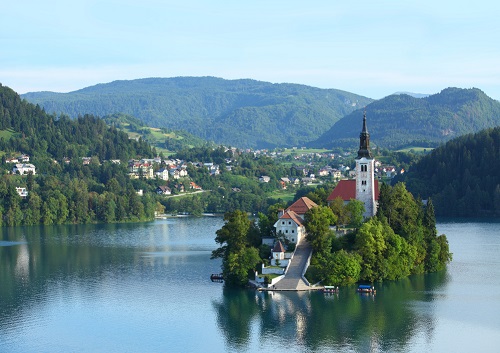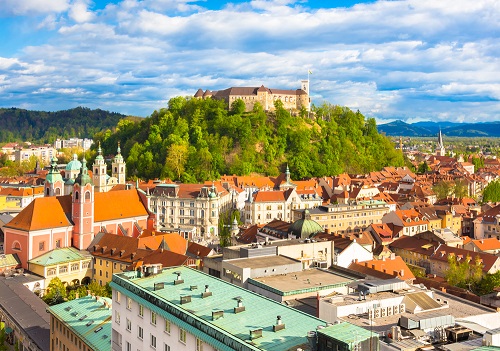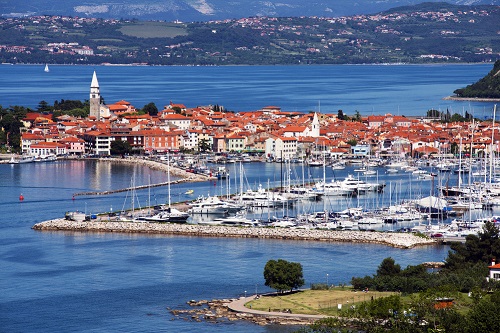Healthcare in Slovenia is generally of a good standard, and dental and ophthalmic care are no exception to this rule. However, while you should not have problems accessing the care you need, you may encounter issues around what is covered by state healthcare and what needs to be covered by out-of-pocket payments.
Slovenian residents are automatically enrolled into the state Health Insurance Institute of Slovenia system (HIIS) – Zavod za zdravstveno zavarovanje Slovenije or ZZZS. It is funded by national contributions, through wages by the employer and employee, as a set amount based on income by self-employed people or deducted from retired residents’ pensions. Children, students, pregnant women, unemployed people and those receiving certain benefits are automatically covered by HIIS.
Which dental treatments are covered by state healthcare in Slovenia?
Some dental care is covered under HIIS, but as with all other non-emergency medical care, a co-payment is required. The co-payment amount ranges from 10% to 90% of the total cost of treatment. For instance, standard dental work requires a 20% co-payment, but only 10% of dental prosthetic treatment is paid by the state under HIIS.
Voluntary (also known as ‘supplementary’) health insurance (VHI) is available in Slovenia from three providers: Vzajemna, Triglav and Generali. As mandated by law, every policyholder pays the same monthly premiums, which vary slightly between the three providers, but which are between €30 and €40. VHI covers co-payments on all medical care under HIIS, so policyholders need only pay for medical treatment that falls outside of this HIIS umbrella.

Certain dental treatments, such as implants, cosmetic treatments, and porcelain crowns and bridges, are not covered at all under HIIS, so these must be paid for in full. However, Triglav and Vzajemna offer dental plans. Monthly premiums start at less than €6 and, depending on the plan, can include annual cleaning and check-ups, white fillings in the sides of the mouth (white fillings in the front teeth are covered by HIIS/VHI), oral cancer treatment, and prosthetics in the event of an accident.
Criticisms of Slovenian dental care
Dentists in Slovenia are required to be highly trained and must register with the Medical Chamber of Slovenia in order to practice in the territory. Dentists must also see a minimum number of patients and meet continuous professional development requirements to continue to practice each year. Dental care quality is therefore high, and Slovenia is becoming an increasingly popular destination for affordable dentistry, attracting patients from across Europe.
Dentistry is the only medical field in Slovenia where private practitioners make up more than 50% of those practicing, and around 15% do not take state or voluntary health insurance. The relative lack of public dentists means that waiting lists can be long for HIIS or VHI patients. Some Slovenians choose to go to Croatia for dental treatment, as they find that the innovation and knowledge can be better there and that the treatment is often more affordable.
What ophthalmic care is available in Slovenia and what is covered by state healthcare?
You should be able to find the ophthalmic care you need in Slovenia, but some services and treatments cost more than others. Clinics offer services, including prescription glasses and contact lenses, treatments for eye diseases, diagnostic exams, and exams required for driving licences. Elective treatment, such as laser eye surgery, is also available privately.
The HIIS insurance plan covers 10% of the cost of ophthalmic appliances for adults, which may include glasses, contact lenses and prosthetics. 90% is therefore payable as a co-payment if you do not have VHI or international health insurance.

All three VHI providers also offer specialist health insurance to cut waiting times, so depending on the situation, ophthalmological care may be covered under this type of plan, but ophthalmology appointments do not need a GP referral. The VHI websites are in Slovene, so if you are looking to have something specific covered by a plan, make sure that you have the help of someone who can translate for you, before you commit to anything online.
The state operates a vision screening system for children at several stages up to seven years old, to support early detection of vision problems and eye diseases. Children with visual impairments can attend Slovenia’s dedicated Centre IRIS (Centre for Education, Rehabilitation, Inclusion and Counselling for the Blind and Partially Sighted) in Ljubljana, which supports children from pre-school to the end of secondary education.
Criticisms of Slovenian ophthalmic care
Ophthalmologists can obtain certification in Slovenia, but this is on a voluntary basis. The Association of Ophthalmologists of Slovenia manages this as an independent body, as well as preserving the role of ophthalmologists and maintaining ethics in the profession. As certification is voluntary, make sure, where possible, that you choose a certified ophthalmologist, and research the specialist you are going to see to make sure you get the right care.
There are relatively few ophthalmologists in Slovenia, and therefore waiting times for routine appointments can be between three and six months. Ophthalmic care can also be quite expensive in Slovenia. In 2003, the territory introduced Diagnoses Related Groups (DRG), whereby acute care was prioritised and ophthalmology as a specialty was devalued. However, this also meant an increase in outpatient procedures, and cataract surgery has been particularly successful, with the highest percentage of outpatient cases in the EU, as reported by the World Health Organisation.
Getting the right dental and ophthalmic care in Slovenia may require a lot of research, and trial and error might be involved with private and state practitioners. You may find, depending on where you choose to live, that having care outside the territory is best. Wherever you go, make sure that you have the right insurance, so that you can avoid high co-payments and out-of-pocket expenses.

